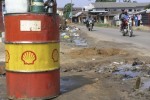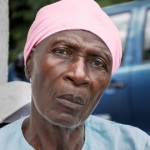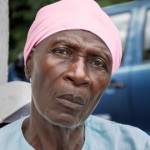Nigeria: Billions Siphoned by Corruption Could Have Been Used to Maintain Fuel Subsidy | Nigeria: La corrupción encendió la mecha
By Mustapha Muhammad
IPS
English | Spanish
KANO, Nigeria – As a nationwide strike and protests against the lifting of the fuel subsidy paralysed Nigeria for the third day in a row Wednesday, analysts say the billions of dollars a year lost to corruption in the oil industry could have been used to leave the subsidy in place.

Demonstrators flock to the streets of Kano to protest the fuel subsidy removal (Mustapha Muhammad/IPS).
“We know that because of the corruption and irrelevant people placed in certain key positions in the sector, a lot of crude oil is being lost,”
Garba Ibrahim Sheka, a senior lecturer in economics at Bayero University in the northern city of Kano, told IPS.
Nigeria has some of the lowest fuel prices in the world. But a majority of the population lives on less than two dollar a day, and the removal of the fuel subsidy since Jan. 1 has hit the poor hard by more than doubling petrol prices and transport fares and driving up the prices of foodstuffs and other commodities that are transported from one region to another.
“This federal government policy comes at a time when the unemployment rate is high: over 40 million people are unemployed”
in this country of 158 million, Sheka said.
“The social impact is that Nigerians are getting poorer, and the poorer they are the more insecurity we have. We expect socially that there will be more poverty, more hunger, and more social problems like armed robbery and this problem of Boko Haram,”
he added, referring to a militant Islamist sect that has carried out attacks and bombings over the last year that have claimed a number of lives.
The decision by the administration of President Goodluck Jonathan to lift the fuel subsidy drove the price of fuel up from 65 naira (35 cents of a dollar) a litre to 150 naira (93 cents) basically overnight.
The government of Africa’s top oil producer said the 7.5 billion dollars spent every year on fuel subsidies could be used to provide desperately needed infrastructure.
Central Bank Governor Lamido Sanusi told reporters in Kano that
“The monies will be used in provision of social amenities and infrastructural development that will benefit Nigerians more and save the country from economic rift.”
The authorities in Africa’s most populous nation also say subsidised fuel is smuggled into neighbouring countries where petrol prices are higher, thus depriving Nigerians of the benefits from the subsidy.
“The subsidy, which runs over one trillion naira, has been shared with neighbouring countries like Chad, Niger and Cameroon,”
Abdullahi Umar Ganduje, deputy governor of Kano state, told IPS.
Nationwide strikes and protests
The lower house of parliament held an emergency session on Sunday Jan. 8, urging the president to suspend the decision to slash the fuel subsidy, and calling on the trade unions to cancel plans for an indefinite strike.
But the government stood by its decision and labour unions, students, academics and activists went ahead with the strike and mass protests on Monday.
Up to 10 people were reported killed and many more were injured in the protests as police used live ammunition in some states to disperse demonstrators.
“We rushed some victims with gunshots wounds to Nassarawa Hospital. A total of 30 protesters were injured,”
Musa Abdullahi, the head of the Red Cross in Kano, told IPS.
A local human rights group, the Civil Rights Congress, condemned the use of excessive force by the police.
Millions of protesters have been taking part in the nationwide demonstrations, marching down the main avenues of the cities chanting anti-government slogans. Most other streets are deserted and shops are closed. In the northern state of Kaduna, two former governors are leading the protest.
“We are not afraid of police brutality and we shall continue with the struggle to the death,”
one of the protesters, Kabiru Musa, told IPS at a demonstration in Kano.
Economic losses
“The impact is going to be devastating; if all the sectors are shut down the government is going to lose billions of naira,”
said Sheka, at Bayero University.
“The longer the strike drags on, the more negative the impact on the economy and the social impact will be,”
said the academic, adding that the government should keep in mind the recent experiences of governments in the Middle East and should be
“wise enough not to allow this to happen.”
Official government figures put crude oil drilling at 2.09 million barrels per day since the Niger delta amnesty deal for militants, aimed at reducing unrest in that oil-rich region, went into effect in 2009.
But analysts accuse Nigerians working in the oil industry of conniving with multinational oil companies, and depriving the country of revenue.
“We believe that if ‘leakages’ can be mended definitely, a lot of money can be realised from the area,” Sheka said.
Nigeria imports refined petroleum products to meet domestic demand, because the country’s four refineries are not functioning at full capacity.
Rising wave of insecurity
Curfews have been announced in the northern state of Kano and other parts of the country, and a state of emergency has been declared in some parts of four states: Borno, Yobe, Plateau and Niger.
But the measures have failed to calm protests and quell attacks. Bombs exploded in Borno and Yobe, suspected to be the work of the Islamist militant group Boko Haram. And no fewer than 25 people were reported killed in attacks on churches in Gombe and Adamawa, in the troubled northeast.
An attack on a mosque in Edo State in southern Nigeria was believed to be carried out in reprisal for the church bombings.
Source: IPS
Por Mustapha Muhammad
IPS
español | inglés
KANO, Nigeria – Las protestas contra la eliminación de los subsidios a los combustibles paralizaron Nigeria este miércoles por tercer día consecutivo, mientras analistas señalan que los miles de millones de dólares que se pierden al año por la corrupción podrían ser usados para mantener las subvenciones.
“Sabemos que, debido a la corrupción y a que hay personas irrelevantes ubicadas en ciertos puestos clave del sector, se pierde mucho petróleo crudo”,
dijo a IPS el economista Garba Ibrahim Sheka, de la Universidad Bayero, en la norteña ciudad de Kano.
Nigeria tiene algunos de los precios más bajos del combustible en todo el mundo, pero la mayoría de la población vive con menos de dos dólares diarios, y por tanto la eliminación de los subsidios, el 1 de este mes, sacudió duramente a los pobres.
Los precios del transporte y de los alimentos básicos, que deben ser llevados de una región a otra, se duplicaron.
“Esta política del gobierno federal llega cuando el desempleo es alto: más de 40 millones de personas están sin trabajo”
en un país con 158 millones de habitantes, indicó Sheka.
“El impacto social es que los nigerianos se han hecho más pobres, y cuanto más pobres más inseguridad tenemos. Habrá más pobreza, más hambre y más problemas sociales como robos armados y Boko Haram”,
añadió, en referencia al grupo fundamentalista islámico que perpetró ataques con bombas el año pasado.
La decisión del gobierno del presidente Goodluck Jonathan de poner fin a los subsidios a los combustibles hizo que el precio pasara de 65 nairas (unos 35 centavos de dólar) el litro a 150 nairas (93 centavos de dólar) prácticamente de la noche a la mañana.
El gobierno de este país, el mayor productor de petróleo de África, arguyó que los 7.500 millones de dólares que se gastan al año en los subsidios podrían ser usados para construir la tan necesitada infraestructura.
El gobernador del Banco Central, Lamido Sanusi, dijo a periodistas en Kano que el dinero sería empleado
“para proveer instalaciones sociales y desarrollar infraestructura que beneficiará a los nigerianos, y que salvarán al país de la ruptura económica”.
El gobierno también señala que el combustible subsidiado es contrabandeado a países vecinos donde los precios son más altos, privando así a los nigerianos de los beneficios de las subvenciones.
Los subsidios
“han sido compartidos con países vecinos como Chad, Níger y Camerún”,
dijo a IPS el vicegobernador del estado de Kano, Abdullahi Umar Ganduje.
Huelga nacional y protestas
La cámara baja del parlamento realizó una sesión de emergencia el domingo 8, instando al presidente a que suspendiera la decisión de eliminar los subsidios, y a la vez llamando a los sindicatos a que cancelaran sus planes de huelga indefinida.
Pero el gobierno mantuvo su decisión, y los sindicatos, estudiantes, académicos y activistas continuaron con sus huelgas y protestas.
Al menos 10 personas murieron y muchas más resultaron heridas cuando la policía disparó contra manifestantes en algunos estados.
“Trasladamos a algunas de las víctimas con heridas de bala al Hospital de Nassarawa. Un total de 30 manifestantes resultaron heridos”,
dijo a IPS el jefe de la Cruz Roja en Kano, Musa Abdullahi.
La organización nigeriana Congreso de Derechos Civiles condenó el uso excesivo de la fuerza por parte de la policía.
Millones de personas vienen participando de las manifestaciones en todo el país, marchando en las principales avenidas de las ciudades y entonando consignas contra el gobierno. La mayoría de las demás calles están desérticas, y los negocios cerrados.
En el norteño estado de Kaduna, dos exgobernadores lideran las protestas.
“No le tenemos miedo a la brutalidad policial, y seguiremos con nuestra lucha hasta la muerte”,
dijo a IPS el manifestante Kabiru Musa, en Kano.
“El impacto va a ser devastador. Si todos los sectores cierran, el gobierno perderá miles de millones de nairas”,
dijo Sheka, de la Universidad Bayero.
“Cuanto más se alarguen las huelgas, más negativo será el impacto en la economía y en la sociedad”,
alertó el académico, añadiendo que el gobierno debería tener en cuenta las últimas experiencias en Medio Oriente.
“Sería sabio no permitir que eso ocurriera”, dijo.
Según datos oficiales, Nigeria extrae 2,09 millones de barriles de 159 litros de petróleo cada día desde que un acuerdo en 2009 con insurgentes en el delta del Níger redujo la inestabilidad en esa zona rica en crudo.
Pero analistas acusan a nigerianos que trabajan en la industria petrolera de connivencia con las compañías multinacionales y de privar de ingresos al país.
“Creemos que si los ‘filtros’ son reparados en forma definida, mucho dinero puede ser obtenido de la zona”, dijo Sheka.
Nigeria importa productos petroleros refinados para cubrir su demanda interna, ya que las cuatro refinerías del país no funcionan a plena capacidad.
Fuente: IPS







Comments
Nigeria: Billions Siphoned by Corruption Could Have Been Used to Maintain Fuel Subsidy | Nigeria: La corrupción encendió la mecha — No Comments